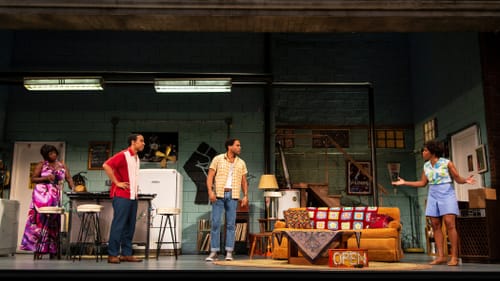Stay in the Loop
BSR publishes on a weekly schedule, with an email newsletter every Wednesday and Thursday morning. There’s no paywall, and subscribing is always free.
How Motown got down
McCarter Theatre Center presents Dominique Morisseau's 'Detroit '67'

Playwright Dominique Morisseau recently received a MacArthur Foundation fellowship, the award colloquially known as the “genius grant.” Anyone wondering why should head to Princeton, New Jersey, where McCarter Theatre Center is giving her early hit Detroit ’67 a terrific production.
This drama, first staged in 2013 at New York’s Public Theater, commences Morisseau’s “Detroit Project,” a multipart love letter to the trials, tribulations, and ultimate resilience of her hometown. She was born a decade after the events that give the play its shape — chiefly, the riots that set the city ablaze in July 1967.
Riot or resistance?
The characters in Detroit ’67 bristle at that word, a label slapped on the situation by biased authorities and outside onlookers. Morisseau smartly keeps the upheaval out of the story’s mainframe, although its presence is tangible.
She concerns herself with those who lived through the events, and those who didn’t. In doing so, she offers a sharp portrait of a city at a turning point, setting up the strands she’ll thread through her later plays Pipeline, Paradise Blue, and the acclaimed Skeleton Crew.
The action unfolds in a makeshift basement saloon on the city’s Near West Side, which designer Riccardo Hernandez renders with pinpoint specificity. Posters of Joe Louis and Malcolm X adorn the walls, while Motown hits play from a newly acquired 8-track player. Brother and sister Chelle (Myxolydia Tyler) and Lank (Johnny Ramey) use the space, which belonged to their recently deceased parents, to make a little money.
Morisseau sets up a generational divide among the siblings, which she metaphorically represents — perhaps a bit too bluntly — through Chelle’s attachment to her old 45 record player, at which Lank scoffs. Lank longs to take their little business legit, buying an abandoned speakeasy with his best friend Sly (Will Cobbs, funny and poignant). Chelle doesn’t want to rock the boat.

Light in the darkness
The boat, of course, gets rocked by the events of the day, whether Chelle likes it or not. Further unease arrives in the form of Caroline (Ginna Le Vine), a white woman found on the side of the road by Lank and Sly, badly beaten and left stranded. Afraid to take her to the hospital, where the sight of two black men admitting an injured white woman might be misconstrued, they set her up in the basement to recover and briefly join the family ecosystem.
Morisseau skillfully balances multiple plot points, although some character details get short shrift. We never learn much about Chelle’s late husband or her teenage son, safely ensconced that summer at Tuskegee University. And some elements of Caroline’s past are explained away a bit too tidily, especially for someone who’s meant to be a disrupting figure and outsider.
Director Jade King Carroll coaxes finely detailed work from the cast, filling out the shaggier edges with fully realized performances. (The ensemble also includes Nyahale Allie as Chelle’s best friend Bunny, a fun-loving woman whose gregarious exterior masks a swell of deep feeling). And Morisseau excels at grounding her story in a sense of time and place, buoyed by the easy rapport among her characters.
Savvy theatergoers will spot obvious analogues in Detroit ’67 — Lorraine Hansberry’s A Raisin in the Sun and Amiri Baraka's Dutchman chief among them — but Morisseau sets her own course and mostly follows through. She cautiously embraces hope, even in Detroit’s darkest hour, and the dissonance between life inside and outside the basement strikes a powerful chord. History, after all, is a record of real people living in time, and that’s what she gives her audience.
Local audiences will gain more exposure to Morisseau’s work later this season, as People’s Light and Theatre Company — which produced Skeleton Crew this past summer — premieres her next play, Mud Row, in June 2019. Until then, take the trip to Princeton, and into Detroit’s past, present, and future.
What, When, Where
Detroit ’67. By Dominique Morisseau, Jade King Carroll directed. Through October 28, 2018, at McCarter Theatre Center, 91 University Place, Princeton, New Jersey. (609) 258-2787 or mccarter.org.
Sign up for our newsletter
All of the week's new articles, all in one place. Sign up for the free weekly BSR newsletters, and don't miss a conversation.

 Cameron Kelsall
Cameron Kelsall